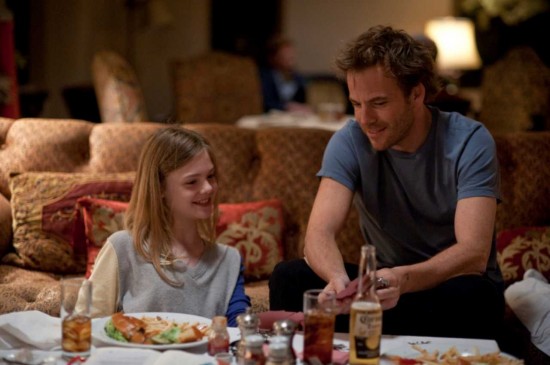Hotels are by no means bad settings for movies. In Barton Fink, The Shining, The Night Porter, or indeed 1932’s Grand Hotel (featuring another famous resident of the Chateau Marmont, Greta Garbo) hotel settings create a claustrophobically intense focus on the characters and some nicely cinematic interiors. But with Sofia Coppola now having made her second hotel-set film (after Lost In Translation), she’s in danger of the very celebrity solipsism that Somewhere is supposedly satirising.
Film star Johnny Marco (Stephen Dorff) is holed up at LA’s infamous Chateau Marmont, drinking, partying and being entertained by lissom pole-dancing twins – all of it as if it’s occurring to someone else. Then, suddenly, his 11-year-old daughter Cleo (Elle Fanning) comes to stay and he’s forced to clean up his act. A bit. And no, that’s not the spoiler-avoiding version: the plot really is that thin.
Somewhere is, by Coppola’s account, inspired by the director’s own childhood with her father, Francis, living out of hotel rooms back in the 70s. Certainly in this depiction of actor Johnny Marco’s life of listless hedonism, Coppola shows an insider’s eye for detail: the procession of rictus-smiled assistants to shepherd and flatter; the slyly matter-of-fact revelation of a height-extending box Johnny’s been standing on during a photo-shoot with a willowy actress (Monaghan); a mutually-enervating party conversation with an aspiring actor.
Although Stephen Dorff’s early ’90s promise faded after an early high with Beatles biopic Backbeat and a drag turn in I Shot Andy Warhol, he deserves this return to the limelight. Having done his own real-life stint in the Chateau Marmont, Dorff brings conviction to his role, inhabiting Johnny with an amiable, shrugging, ‘whatever’ confusion. His scuffed handsomeness and ageing grunger look is also a good visual fit. However, Dorff is no Bill Murray, able to animate silence or suggest depth in slight dialogue the way Murray did in Lost In Translation. Ultimately, it’s hard to feel much sympathy for this pampered, feted product of the celebrity system.
Somewhere is a very similar film to Lost In Translation – a two-hander about alienation in hotel rooms – and any suspicions about a lack of depth in that film are amplified with this. That the glib Marie Antoinette came between doesn’t help. There’s little action, and no noticeable narrative arc: the supposed cleaning-up of Marco’s act while spending quality time with daughter Cleo is barely perceptible, while his culminating walk into the blue yonder is more confusing than climatic. The ‘loaded gun’: a text-message harassment subplot never actually fires (one can only suppose it’s his subconscious speaking). Worse, the dialogue’s deliberate depiction of inarticulacy risks just being dull. As does a slightly wearing insistence on ‘art’: Coppola seemingly plays Hanneke at his own long-take game with scene after scene featuring Dorff barely moving in his hotel room, the camera static, minutes ticking by as slowly for the audience as for Marco.
When the focus is on the relationship between Marco and his daughter however, the film enlivens and acquires a heart. Elle Fanning is excellent as Cleo with her sweetly grounded, adaptable, acceptance of her father’s limitations. If that seems a slightly flattering self-portrait, it’s actually the least grating aspect of a film that otherwise seems solipsistically self-immersed.


